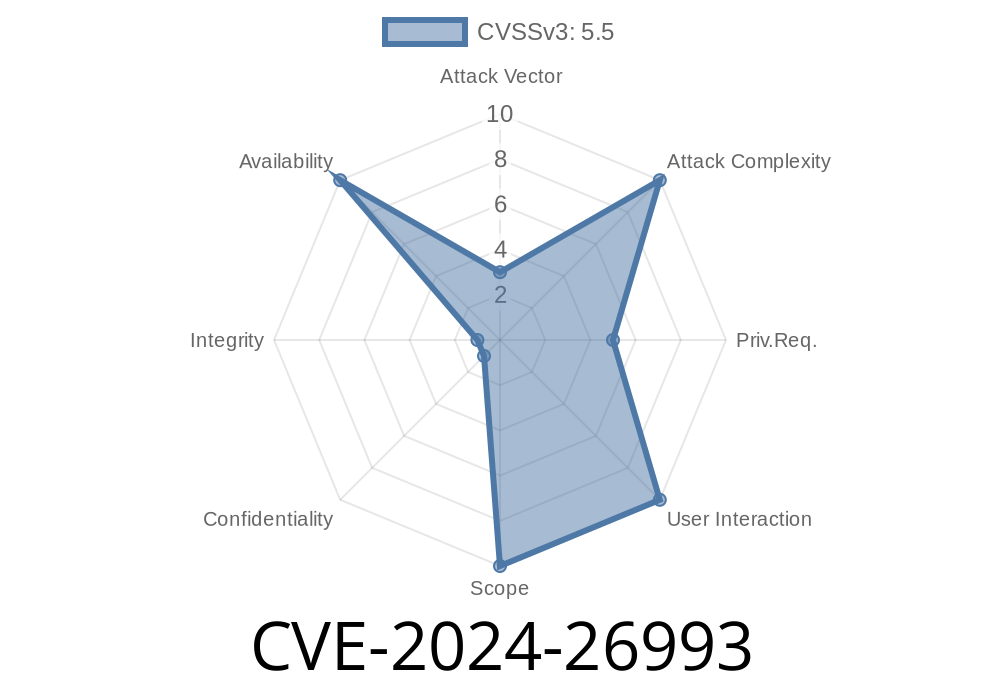A security vulnerability (CVE-2024-26993) in the Linux kernel was recently patched, relating to a reference leak in the sysfs code. If you’re managing Linux systems or developing kernel modules, this is something you should know about. Let’s break down what happened, why it matters, and show you code snippets to make it concrete.
What Is CVE-2024-26993?
CVE-2024-26993 addresses a bug in the Linux kernel’s sysfs handling, specifically in the sysfs_break_active_protection() function. The gist: if an error happens when looking up a kernfs node (using kernfs_find_and_get()), the kernel object (kobj) reference is forgotten—this wastes kernel memory, and over time, can lead to memory leaks or system instability.
The Error in Simple Terms
- Before the fix: If kernfs_find_and_get() fails and returns NULL, the function bails out without cleaning up the kobj reference.
- This “leak” means the reference count is never decremented—think of it as a borrowed library book that is never returned.
Here’s a simplified version of the vulnerable code logic
int sysfs_break_active_protection(struct kobject *kobj, const char *path) {
struct kernfs_node *kn;
kobject_get(kobj);
kn = kernfs_find_and_get(kobj->sd, path);
if (!kn) {
// Oops! We forgot to clean up the kobject here
return -ENOENT;
}
// ... do other stuff ...
sysfs_unbreak_active_protection(kn);
kernfs_put(kn);
kobject_put(kobj);
return ;
}
The Problem
If kernfs_find_and_get() fails, kn is NULL, but kobject_get(kobj) was called and never released! That’s the reference leak.
The Fix (After the Patch)
The kernel patch adds the missing release—making sure the kobj reference is properly dropped even on error:
int sysfs_break_active_protection(struct kobject *kobj, const char *path) {
struct kernfs_node *kn;
kobject_get(kobj);
kn = kernfs_find_and_get(kobj->sd, path);
if (!kn) {
kobject_put(kobj); // <-- Fix: release the reference
return -ENOENT;
}
// ... do other stuff ...
sysfs_unbreak_active_protection(kn);
kernfs_put(kn);
kobject_put(kobj);
return ;
}
Can this be hacked?
This bug does not directly allow an unprivileged user to get code execution or immediate root access. However, it could potentially be leveraged by a local attacker to create a Denial of Service (DoS) situation—by causing the kernel to slowly leak memory, starving the system if the vulnerable function can be triggered repeatedly.
Exploit Example (Hypothetical)
// Pseudo code: repeatedly calls an interface which triggers sysfs_break_active_protection with an invalid path
while (1) {
ioctl(sysfs_fd, TRIGGER_BROKEN_PATH, "/nonexistent/path");
// Or writes to a sysfs file that leads to the vulnerable function
}
If done rapidly, the repeated leaks could use up kernel memory, slowing the system, or even causing a crash (kernel panic) if memory is exhausted.
You run a Linux kernel version prior to the patch.
- An attacker can trigger sysfs operations with invalid paths (possibly through buggy hardware drivers or misbehaving userland tools).
Most desktop and server admins are unlikely to be directly targeted, but embedded systems, or systems exposed to untrusted local code, should patch promptly.
## How to Fix / Patch
- Upgrade your kernel! Distributions are releasing updates. Check with
- Red Hat Security Advisory: RHSA-2024:XXXX
- Debian / Ubuntu: Debian Security Tracker
- Mainline kernel commit: Upstream Patch
Original References
- Linux kernel mainline patch
- NVD Entry for CVE-2024-26993
- Debian Security Tracker
Summary Table
| Exploitability | Impact | Patch Available | Public Exploits |
|----------------|-------------|-----------------|-----------------|
| Local only | Memory leak | Yes | None known |
Closing Thoughts
Simple bugs can sometimes have lasting impacts in core technology like the Linux kernel. If you manage any system using Linux, check your kernel version and make sure you’re covered for CVE-2024-26993 and similar reference counting bugs. Even “small” leaks can eventually create big headaches.
*Stay patched and safe!*
*This post is original content. Feel free to share and reference it.*
Timeline
Published on: 05/01/2024 06:15:17 UTC
Last modified on: 12/23/2024 20:43:56 UTC
